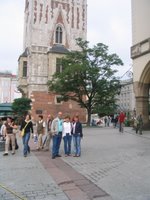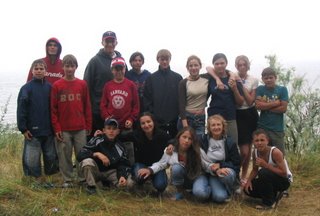
The book in the picture is part of an amazing story. It is the sort of story that I have only read about and this was the first time in my life where I was able to hear it first hand. I will not do the story, or the storyteller, Mikhail Ivanovich Vodolazhsky, justice. But talking with him has been one of the highlights of my time here. I apologize about the quality of the photo, the book is amazingly small and my hands aren’t so steady when holding a camera.
Mikhail Ivanovich is either 92 or 93 years old. He was born before the Bolshevik Revolution on a farm in the Kharkov region of Ukraine. Around his eighth birthday his father’s farm and work were taken over by the government and became a part of a collective farm. Times were tough. Mikhail Ivanovich dropped out of school and moved, along with his two older brothers, to the city in search of work.
In his late teens he did his time of service with the Soviet army. His commanding officer fell out of favor with those above him and an order came down from above, requiring 100 men from his unit be sent to the “Gulag” labor camps. The officials searched through the soldiers’ personal belongings and found 200 “enemies of the people.” He had a journal in which he had written some of his favorite Bible verses and Sunday School songs so he was included in this number. He was sentenced to eight years at a Gulag 100 kilometers north of Magadan, in the northeastern part of Siberia.
Mikhail Ivanovich had not yet married his fiancé, and she told him she would wait for him “even if it took 10 years.” He was sent to a camp where he and many others prospected for gold while serving their sentences. Each was required to dig a hole, 1m x 1m x 1m every day, rain or shine, in the frosty soil and send it off to be panned. Fortunately, Mikhail Ivanovich was skilled at repairing the felt boots worn in the winter months and was therefore moved indoors during the coldest, hardest months. Many of the people in his Gulag died; almost all lost one or more extremities to frostbite.
He was released after eight years, but was forced to remain in the region for a period of exile. His fiancé learned of his release and exile and somehow, miraculously, traveled across the 13 time zones to meet and marry Mikhail Ivanovich at the train station, almost exactly 10 years after their last meeting.
They lived there for several years, and their three children were born there. At one point in time, they were told they could return home. They gave away or sold the majority of their possessions and packed the rest for the long journey “home.” Unfortunately, on the day they were to leave they were told they could not go. They went back to those who had their possessions and collected their things. Fortunately there were no problems with this because, according to Mikhail Ivanovich, after living through the hardships together the people there had become “closer than family.”
It became known that Mikhail Ivanovich was leading small church services in his home. He was immediately sentenced to another 10 years in the “camps.” This is where the Bible pictured above comes in to the story. During his first sentence he and 20 other inmates shared a contraband Bible which belonged to one of his fellow inmates. During his time of exile, his wife had given him his o wn Bible, which he in turn shared with around 10 others. He talks about how he was “overjoyed” to have the opportunity to have the Bible on Sundays, his day off. He would go off to some isolated place and read “under a blanket” as they often say here when referring to clandestine behavior.
wn Bible, which he in turn shared with around 10 others. He talks about how he was “overjoyed” to have the opportunity to have the Bible on Sundays, his day off. He would go off to some isolated place and read “under a blanket” as they often say here when referring to clandestine behavior.
Midway through this term, “Comrade Stalin” died and Mikhail Ivanovich and others were exonerated by Khrushchchev. The family left Magadan for the 9-day boat ride to Vladivostok, on the far east coast of Russia, then a 17-day train ride back to Kharkov in Ukraine. They have lived there until now. Now Mikhail Ivanovich (front left in picture) and his brother, Pyotr Ivanovich (front right), live in a small room built on to the house where his son Yura (back) lives with his family. The “grandpas” spend most of their time talking and studying their Bibles, now above the blankets.
Dave





















